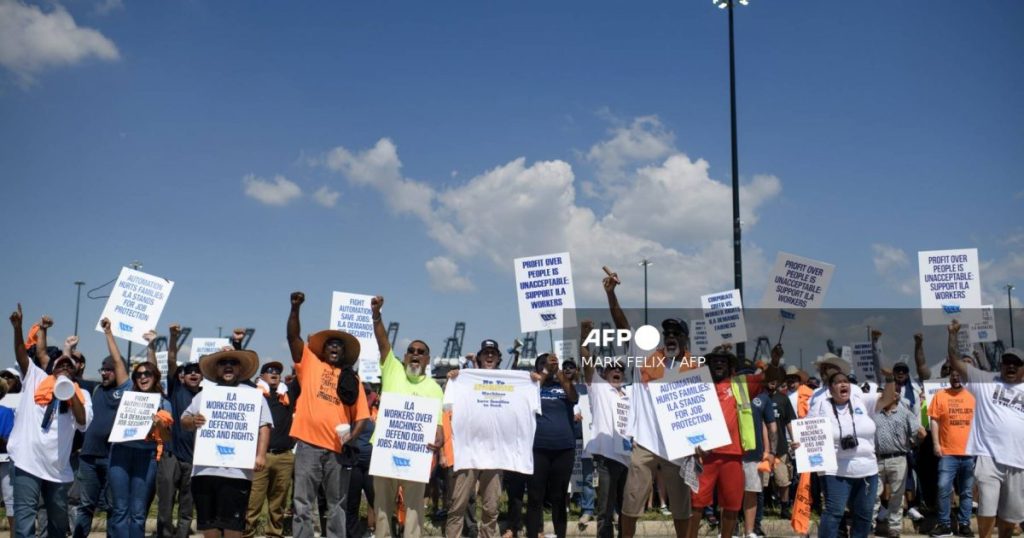Tens of thousands of workers at major ports along the U.S. East and Gulf Coasts initiated a significant strike on Tuesday, causing a ripple effect that poses the risk of impacting the country’s economy, particularly in the lead-up to the forthcoming presidential election. The strike, which marks the first by the International Longshoremen’s Association (ILA) in nearly half a century, involves approximately 45,000 workers across 36 ports from Maine to Texas. These key ports are crucial as they handle a vast spectrum of goods, ranging from food items to electronic products. This unprecedented action took place after prolonged negotiations between labor representatives and the United States Maritime Alliance (USMX), which represents shipping companies and terminal operators, ultimately failed to yield a resolution past the midnight deadline.
At the heart of the strike are pressing issues such as concerns over port automation and wage increases. The ongoing protests, exemplified in Elizabeth, New Jersey, where workers mobilized with signs denouncing automation, reflect a growing anxiety among dockworkers regarding job security in a rapidly evolving industry. This strike could potentially exacerbate the already fraught economic landscape, as analysts have warned that a prolonged work stoppage could lead to significant shortages and increased prices in a market attempting to stabilize following previous inflationary pressures. Meanwhile, President Joe Biden and Vice President Kamala Harris are attending to the situation closely, reassured by assessments indicating that immediate consumer impacts may be limited, as per a statement from the White House.
Despite these reassurances, calls for action have emerged. Biden expressed the need for a “strong and fair offer” to be put forth by the ocean carriers, which he noted have seen substantial profits recently. He reiterated the need for fair labor practices in light of the essential services provided by dockworkers throughout the Covid-19 pandemic. Simultaneously, former president Donald Trump criticized Biden, claiming his administration’s failure to negotiate an agreement prior to the strike is partially responsible for the current crisis. The tension surrounding labor negotiations is compounded by public and political sentiments surrounding workers’ rights and protections as economies recover from the pandemic.
The collective bargaining conversations have been complicated by the fears surrounding automation, pushing the ILA to seek protections against potential job losses connected to technological advancements within the industry. Reports suggest that the union is demanding a staggering 77 percent wage increase over a six-year period, while USMX claims to have proposed a nearly 50 percent wage increase as part of their latest offer. As the conflict escalates, each side accuses the other of misrepresenting facts regarding the negotiations and working conditions, highlighting the growing strife in the labor relations landscape.
Various economic forecasts suggest that the strike could inflict significant damage on the U.S. gross domestic product, with estimates ranging from $4.5 billion to $7.5 billion lost weekly depending on the duration of the work stoppage. While some analysts argue that the anticipated economic consequences may be overstated due to learned resilience from past supply chain disruptions, the ramifications of a prolonged strike could be severe, especially during a politically delicate period for the Biden administration. Economic analysts also note that, should the strike continue to worsen, President Biden may find himself with limited options, potentially prompting a reevaluation of labor policies right before a highly contested election.
As the strike unfolds, it exemplifies the rising conflict within labor relations in the United States, marked by the recent momentum of high-profile strikes across various industries, including automotive and aviation. The longshoremen’s sentiments of feeling “underappreciated” post-pandemic underscore the broader pressure that workers are facing in various sectors, advocating for wages that reflect their contributions. With the backdrop of tech-driven transformations that threaten traditional jobs, workers are far more vocal about their needs for sustainable employment and fair compensation. The interplay of these dynamics will be crucial to monitor as the strike progresses and as parties strive toward a resolution in the face of mounting economic and political pressures.














